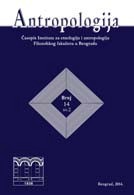RAZLIKA IZMEĐU KLAUZEVICEVOG I FUKOOVOG TUMAČENJA RATA
THE DIFFERENCE BETWEEN KLAUSEWITZ AND FAUCAULT
UNDERSTANDING OF WAR
Author(s): Nada SekulićSubject(s): Structuralism and Post-Structuralism, Military policy, History and theory of sociology, Social Theory, Sociology of Politics, Peace and Conflict Studies
Published by: Институт за етнологију и антропологију
Keywords: man and war; war theories; the art of war; sovereignty; authority; power;human factor in war; Klausewitz; Foucault;
Summary/Abstract: The understanding of the relation between the man, society and war is expressed in the sets of historically changeable relations, where the theories and doctrines of war tell us a lot not only about the art of warfare and the ways wars were waged throughout history - as it may seem at first, bearing in mind their focus on the matters of strategy, tactics, logistics, armed formations, manoeuvres, sieges, soldier drill, etc - but they also provide us with information on general understanding of man, the level of organization of society, and of the regimes of knowledge and the new "models of truth", characteristic of certain age. The choice to discuss the relation between Klausewitz’s and Faucault’s understanding of war in this paper is determined by the anthropocentric twist which occurs in the theory and practice of war in late 18 and early 19 century. It is in this period that modern theory of war is established, by introducing human factor and manpower as the backbone of warfare instead of earlier siege wars around fortifications. The main theoretical representative of the new approach is Klausewitz. He gives central importance and the key role to man in defining the outcome and the goals of war, and modern war is defined as a clash of manpower also in the political sense, as an expression of general will in the society. Historically, this is the period of establishment of modern states, of the sovereignty of the people, and the period when conscription was introduced. On the other hand, and in contrast to this approach, according to Foucault this is the period of establishment of modern anthropocentric episteme and of introduction of mechanisms of total bio-political surveillance in the management and control mechanisms of the state, the most exemplary manifestation of which is found in military institutions and techniques of military training and warfare. According to Foucault, the state takes over the monopoly of warfare and defines war in a total sense, as total war for existence, as the war of a nation for its survival, a necessity, as both regularity and irregularity of the state order, thus pushing it to the margin of its legitimacy as a lasting, hidden subtext, but also as a generator and driving force of the dynamics of society and as a cornerstone of modern, popular sovereignty. The idea of popular sovereignty represents the ideological framework for modern instrumentalization of citizens for warfare. These two approaches represent diametrically opposed starting points regarding the relation between sovereignty, authority and war and the understanding of the importance and role of man in the wars of modern states.
Journal: Antropologija
- Issue Year: 11/2011
- Issue No: 2
- Page Range: 91-113
- Page Count: 23
- Language: Serbian

